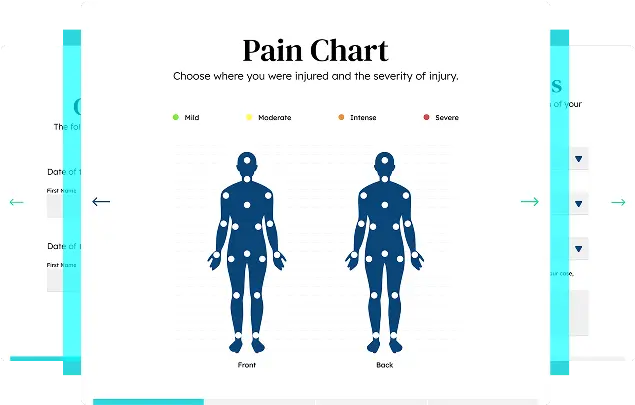Methuen ATV Accident Lawyer
If you’ve been in an ATV accident in Methuen, we’re here to help. Our team of skilled personal injury lawyers understands the significance of having strong legal representation. In this guide, we’ll walk you through the necessary steps after an ATV accident and offer insights on building a solid case. We’ll also cover how to pursue compensation for your injuries. Count on us for reliable, informative, and objective advice to support you in the aftermath of your accident.
Get Free Advice About The Compensation You Deserve
Home » Methuen Personal Injury Lawyer » Methuen ATV Accident Lawyer
Reviewed by: Christopher DiBella
April 20, 2025
Key Takeaways
- Hiring an experienced ATV lawyer can greatly increase your chances of a favorable resolution.
- An ATV lawyer can gather and present compelling evidence to establish liability and prove damages.
- Regular maintenance of your ATV is important to prevent accidents.
- Wearing a helmet and protective gear can significantly reduce the risk of injuries.
Understanding ATV Accidents in Methuen
In Methuen, we need to understand the causes and consequences of ATV accidents. ATV accidents can result in severe injuries and even fatalities. Common ATV injuries include broken bones, head injuries, spinal cord injuries, and lacerations. It is crucial to take proper ATV safety precautions to prevent these accidents and protect ourselves and others.
One of the most important ATV safety precautions is wearing a helmet. A helmet can significantly reduce the risk of head injuries in case of a crash or fall. It should fit properly and be securely fastened. Additionally, wearing protective gear such as goggles, gloves, long-sleeved shirts, long pants, and sturdy boots can provide further protection.
Another essential safety measure is to ride within your skill level and age restrictions. ATVs come in different sizes and power levels, and it is crucial to choose an ATV that is appropriate for your experience and age. It is also important to follow all local laws and regulations regarding ATV usage.
Regular maintenance of your ATV is essential for ensuring its proper functioning and reducing the risk of accidents. Checking the brakes, tires, and other mechanical components before each ride can help identify any potential issues that could lead to accidents.
Lastly, never ride an ATV under the influence of alcohol or drugs. These substances impair judgment, coordination, and reaction time, increasing the likelihood of accidents.
The Importance of Legal Representation
Our experience has shown us just how crucial it is to have proper legal representation. When it comes to ATV accident cases, the role of evidence is paramount in determining the outcome. Hiring an experienced ATV lawyer can provide numerous benefits that can greatly increase your chances of a favorable resolution.
One of the key benefits of hiring an ATV lawyer is their ability to gather and present compelling evidence. In ATV accident cases, evidence such as photographs of the accident scene, witness statements, and medical records play a crucial role in establishing liability and proving the extent of damages. An experienced lawyer knows how to effectively collect and present this evidence, ensuring that your case is strong and persuasive.
To illustrate the importance of evidence in ATV accident cases, let us consider the following table:
| TYPE OF EVIDENCE | IMPORTANCE |
|---|---|
| Eyewitness Testimony | High |
| Accident Scene Photos | Moderate |
| Medical Records | High |
| Expert Witness Reports | High |
As you can see, each type of evidence holds varying degrees of importance. An experienced ATV lawyer understands the significance of each piece of evidence and knows how to utilize it to build a strong case on your behalf.
In addition to gathering evidence, an ATV lawyer also possesses the legal expertise to navigate the complexities of the legal system. They are well-versed in the laws and regulations surrounding ATV accidents and can ensure that your rights are protected throughout the legal process.
We’ve offered crucial support and guidance to individuals who have suffered injuries, ensuring their financial and emotional well-being.
Steps to Take After an ATV Accident
After an ATV accident, the first thing we should do is ensure our safety and seek immediate medical attention if necessary. Our well-being is of utmost importance, and it is crucial to prioritize our health in such situations. Once we have taken the necessary steps to address our immediate needs, there are a few additional steps we should consider taking.
One important step is filing insurance claims. This is essential to ensure that we receive the compensation we may be entitled to for any damages or injuries resulting from the accident.
It is important to gather all relevant information, such as photographs of the accident scene and any medical records, to support our insurance claim. We should also keep track of any expenses incurred due to the accident, such as medical bills or repair costs, as these can be included in our claim.
Another important step is contacting witnesses. Witnesses can provide valuable information about the accident and help establish liability. It is important to collect their contact information and statements as soon as possible after the accident. This will help in building a strong case, should legal representation be necessary.
Building Your ATV Accident Case
When building our case for an ATV accident, it is crucial to gather evidence and gather witness statements to establish liability and seek compensation. Gathering evidence is a vital step in proving negligence and ensuring that justice is served. To build a strong case, we need to collect as much evidence as possible.
One key aspect of gathering evidence is documenting the scene of the accident. Taking photographs or videos of the surroundings, any damages, and the position of the vehicles involved can provide crucial visual evidence. Additionally, gathering any physical evidence such as broken parts or skid marks can help reconstruct the accident and establish liability.
Witness statements also play a crucial role in building an ATV accident case. Identifying and interviewing witnesses who saw the accident occur can provide valuable insight into what happened. Their testimonies can help establish negligence and strengthen our case. It is important to gather witness statements as soon as possible while the details are fresh in their minds.
In addition to witness statements, medical records and expert opinions can further support our case. Obtaining medical records that document your injuries and treatment is essential in proving the extent of your damages. Expert opinions from accident reconstruction specialists or medical professionals can provide objective analysis and support our claims.
Get immediate case evaluation with no cost or obligation to you in less than 5 minutes.

Seeking Compensation for ATV Accident Injuries
To ensure we receive the compensation we deserve for our ATV accident injuries, it is crucial to gather all necessary evidence and consult with a legal professional. ATV accident claims and ATV injury lawsuits can be complex and require thorough preparation to build a strong case. By following the right steps and seeking the assistance of a knowledgeable ATV accident attorney, we can navigate the legal process and increase our chances of receiving fair compensation.
The first step in seeking compensation for ATV accident injuries is to gather all relevant evidence. This includes documenting the scene of the accident, taking photographs of any damages or injuries, and obtaining witness statements if possible. Medical records and bills should also be collected to demonstrate the extent of our injuries and the financial impact they have had on our lives.
Once we have gathered all necessary evidence, it is important to consult with a legal professional who specializes in ATV accident claims and ATV injury lawsuits. An experienced attorney can review our case, assess the strength of our claim, and guide us through the legal process. They can help us understand our rights, negotiate with insurance companies, and if necessary, represent us in court.
In ATV accident claims and ATV injury lawsuits, it is essential to have a legal professional on our side who understands the complexities of these cases. They will fight for our rights and work tirelessly to ensure we receive the compensation we deserve. By gathering evidence and seeking the assistance of a skilled attorney, we can increase our chances of a successful outcome and focus on our recovery.
Let Our ATV Accident Attorneys Help
ATV accidents in Methuen can have serious consequences, resulting in injuries and significant financial burdens. It is crucial to seek legal representation to navigate through the complexities of these cases and ensure your rights are protected.
By taking the appropriate steps and building a strong ATV accident case, you can increase your chances of obtaining the compensation you deserve for your injuries and damages.
Frequently Asked Questions
Are There Any Specific Laws or Regulations in Methuen Regarding ATV Usage and Safety?
There are specific laws and regulations in Methuen regarding ATV usage and safety. It is important to understand these regulations to ensure compliance and prevent accidents. If you are involved in an ATV accident, there is a specific timeframe within which you can file a claim for compensation. Eligibility for ATV accident compensation depends on various factors, including the extent of damages and negligence involved. Expert witnesses play a crucial role in ATV accident cases to provide valuable insights and support claims.
How Long do I Have to File a Personal Injury Claim After an ATV Accident in Methuen?
When it comes to filing a personal injury claim after an ATV accident, it’s important to be aware of the statute of limitations. This refers to the time limit within which you must file your claim. It’s advisable to seek legal representation to ensure that your rights are protected and that you have the best chance of receiving compensation. Eligibility for compensation will depend on factors such as negligence defense and the types of damages recoverable in your case.
Can I Still Seek Compensation If I Was Partially at Fault for the ATV Accident?
Yes, you can still seek compensation even if you were partially at fault for the ATV accident. The concept of partial fault is taken into consideration in personal injury cases. The amount of compensation you may receive could be reduced proportionally based on your degree of fault. However, it is important to consult with a qualified attorney who specializes in personal injury law to understand the specific laws and regulations in your jurisdiction. They can guide you through the legal process and help you determine the best course of action.
What Types of Damages Can I Potentially Recover in an ATV Accident Case?
When it comes to recovering damages in an ATV accident case, there are various types of compensation that we can potentially seek. These may include medical expenses, property damage, lost wages, pain and suffering, and even emotional distress. It’s important to gather all the necessary evidence and work with a skilled attorney who can build a strong case for us. By understanding the types of damages available, we can better advocate for our rights and seek the appropriate compensation we deserve.
Do I Need to Hire an Expert Witness to Strengthen My ATV Accident Case?
When it comes to strengthening your ATV accident case, hiring an expert witness can be crucial. An expert witness brings specialized knowledge and experience that can help establish liability and prove the extent of damages. They can provide valuable insights and testimony based on their expertise in ATV accidents. Having an expert witness on your side can greatly enhance your chances of a successful outcome in your case.
